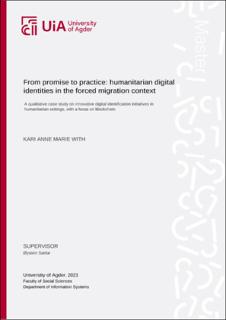| dc.description.abstract | A panoply of different actors are turning to the promises of emerging and digital technologies to address global forced migration and identification (ID) challenges. At the forefront is the humanitarian field, a sector which has become increasingly digitalised in recent years. To explore and adopt novel technologies and solutions, collaborations with private sector entities such as technology firms have become an increasingly common facet of humanitarian action.
The purpose of this qualitative study is to examine humanitarian digital ID solutions in the forced migration context. More specifically, the study seeks to uncover how various sociotechnical elements may impact the delivery of services to forcibly displaced people. To narrow down the focus, the study delves into the empirical use case of blockchain and investigates various actors’ perspectives on this technology, as well as key factors enabling and hindering its implementation and effects in this domain. The study draws on work system theory and affordance theory to develop a joint analytical framework. The study makes both empirical and theoretical contributions to the extant scholarship on digital IDs and blockchain in forced migration and humanitarian settings. Empirically, by shedding light on blockchain-aided humanitarian projects and their diverse implications. Theoretically, by proposing how work system theory and affordance theory can be combined to analyse sociotechnical phenomena.
To unpack the significance and implications of digital IDs and the role of blockchain in the humanitarian sphere, the analysis is based on a literature review, 10 qualitative interviews and the application of the study’s analytical framework. The interview sample consists of international actors from various humanitarian and technology companies, as well as individuals with in-depth knowledge about digital IDs and forced migration. The study finds that these actors have varying perceptions on the potential, opportunities, challenges and benefits of digital IDs and the role of blockchain. Many of the humanitarian digital ID pilots launched have not progressed into full-scale projects. While there are many different reasons for this, the primary and secondary data suggests that key factors include limited resources and lacking digital infrastructure, connectivity and smartphone access in some of the areas where the initiatives are introduced, as well as the sensitivity and complexity attached to digital IDs.
The findings indicate that there is a continuous need to leverage the affordances connected to emerging technologies in humanitarian digital ID initiatives, while also mitigating and fully understanding the accompanying hurdles and risks. The findings also reveal how blockchain is just one the technologies in much larger sociotechnical ecosystems. Although blockchain functions well in some contexts, there are other instances where different technologies might be better suited. Despite the hype connected to various emerging technologies, the global ID challenge is fundamentally social and human in character rather than technical. Therefore, it requires political and legislative reforms, policy regulations, as well as deliberate decision-making and an adequate understanding of forcibly displaced individuals’ needs and situations. While self-sovereign identity solutions are making headway in contexts where individuals are mostly online and already have access to legal IDs, basic rights, public services and mobile devices, there is still progress to be made to protect the interests of vulnerable and forcibly displaced populations located in digitally underserved and low-connectivity settings. | |
